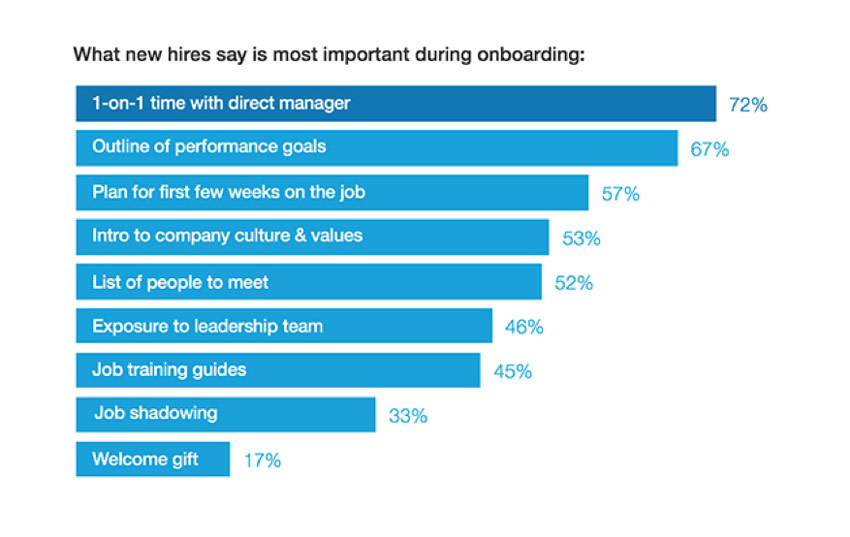
You’ve just hired a star performer and it’s time to introduce them to your business. But in your experience, employee integration has been a somewhat challenging experience. Here are 10 things new hires want from employers:
1. A strong and valuable onboarding experience
First day jitters are no fun for new hires, but they can be avoided as part of a strong onboarding program. What can you do to strengthen your onboarding program? Provide access to the right people, set performance expectations, and cover what happens over the next few weeks. This sets the tone and expectations for the new starter and makes their onboarding experience more practical.
In fact, in LinkedIn’s In the Mind of Today’s Candidate, a survey of 14,000 global professionals and their most preferred onboarding experiences, one-on-one manager time, the provision of performance goals and a structured plan ranked as the top three most important onboarding new hire requirements.
How effective is your organization’s onboarding program?

2. An inclusive culture
Making new hires feel at home as soon as possible fuels productivity because inclusive cultures makes it easier for new hires to acclimate, and once a sense of security sets in, they find it easier to contribute as they feel like part of the team.
According to research, receiving a list of co-workers who staff should meet makes acclimating to the new environment easier.
Other measures worth considering include arranging group gatherings in informal settings, such as a dinner or drinks. Giving your starters the chance to feel a little more at ease in a casual environment allows them the opportunity to connect with their new colleagues more easily.
How are you creating an inclusive culture in your business?
3. Status updates on the business
Shifts in business cause a lot of stress for employees, especially if these changes are not communicated effectively. Therefore, providing updates on the status of your business goes a long way to relieving the anxiety caused by turbulent markets.
For new hires, regular updates help them ease into the new roles with less trepidation about the stability of the future or the fear that they may need to start looking for a new job.
Are you providing your team enough information about the state of your business?
4. An open-door policy
Open-door policies are effective because they encourage transparency, allowing employees to develop a degree of line-of-sight and a view of the bigger picture. They also encourage communication between leadership and staff, making it easy to address challenges and course correct faster.
New hires appreciate an open-door policy because it ensures they have a voice and that it matters, that they have the opportunity to address issues before they escalate, and can receive rapid feedback, but also that they have the chance to make a real difference based on their abilities.
Does your business’s open-door policy drive employee engagement?
5. Health and wellness programs
There’s a shift taking place across the globe today and more people are opting for healthier lifestyles, despite the high costs involved. In the US alone, organic food sales rose to $43 billion in 2017, up by 8.4% from the previous year.
This matters to your business because your new hires are part of this increasingly health-conscious group. They have health goals and want the employers to support them, and therefore the one-size-fits-all approach to health and wellness programs no longer works.
Today, your health and wellness program must be flexible enough to accommodate your diverse workplace. This can include daily fruit baskets, smoothies, and access to onsite gyms with personal trainers as well as performance coaches.
Is your approach to health and wellness meeting your employees’ standards?
6. Engagement
According to Gallup, 71% of millennials are either not engaged or actively disengaged at work, with 60% admitting that they are open to different job opportunities. Engagement is a core component of any job, and we found that it’s best practiced when it’s prioritized.
Engagement matters to new hires as it directly influences their job satisfaction.
The most employee-empowering businesses are religious about providing feedback and performance reviews as both drive communication, and where communication exists, strong levels of engagement are maintained, and performance thrives.
Are your new hires engaged enough?
7. Honest and capable leaders
In a recent poll of 10,000 employees, project management software firm Monday.com found the following to be the top qualities that staff see good managers embodying:
- Leadership
- Honesty
- Ability to delegate
For your new hires, exposure to leadership who embody these qualities cultivates the right levels of loyalty and motivation to contribute more, especially when it comes to younger and more impressionable staff, or those who left their last employer due to lack of transparency or a toxic culture reinforced by leadership.
How does your leadership team promote leadership qualities that empower your staff?
8. Autonomy
The most successful autonomous work environments thrive because staff have been assigned boundaries within which they must work. Within these boundaries, employees can determine the “how” of what they need to do to achieve the result.
Autonomy is appealing to new starters as it makes work more engaging while increasing job satisfaction, and for competitive firms, it can lead to new product discoveries such as Post-it, the product of a program 3M launched to encourage staff to work on new projects.
How is your organization promoting autonomy?
9. Regular feedback
Performance anxiety is a common challenge for new starter, which is why timely feedback is critical – at least once a week and with a line manager – to ease the anxiety and increase engagement levels. This approach gives new hires a sense of control over their performance and makes them feel like a valued member of the team.
How regularly does your business provide feedback?
10. Growth opportunities
The growing millennial workforce has created a strong culture of competition, with more Gen Y’s pressing on for growth – even if it means leaving your organization to seek out new opportunities.
In our experience, there are two ways that a need for growth can be addressed. The first is to develop an internal gig economy, and the second is to be transparent about the organization’s growth opportunities with all new starters.
We’ve written a great blog post on how you can benefit from internal gigs, and you can read it here. When it comes to transparency, effectively communicating how promotions and growth opportunities work within your business, from the requirements to your vetting process, helps new starters set personal goals.
With personal goals in place, new starters can settle in to work mode faster with higher levels of commitment and a stronger sense of loyalty.
How does your organization promote employee growth?
Conclusion
What do new hires want from employers? Just evidence they’re valued. By creating an environment that promotes employee satisfaction, your business will be able to attract and promote more top performers.
Try vi
We’d love to take you through a short demonstration of our employee retention solution and show you how to create a better-performing, happier workforce. To book a time, just follow the link below and leave your details. We’ll get back to you!